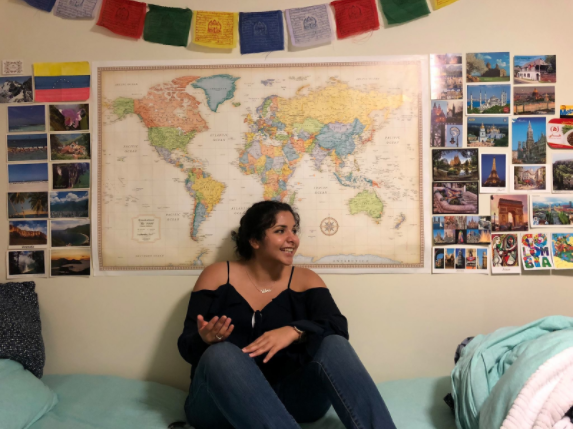Junior Valeria Guerra is no stranger to asking questions from different perspectives.
Whether it’s languages, anthropology, or biochemistry, if Guerra has a question, she wants the answer.
“That’s what research is: trying to find out the answers to basic questions that actually turn out more complicated the more you investigate,” said Guerra, a biochemistry major and soon-to-be Take Five Scholar.
Her research career started in a medical anthropology course, where she learned about kuru, a rare and fatal neurodegenerative disease found in people from New Guinea who practiced cannibalism of brains as a funeral rite.
Kuru is caused by the aggregation of misfolded prion proteins, which can be transmitted and may cause normal proteins to misfold, preventing proper protein function.
The topic sparked her curiosity in prion diseases. Coincidentally, one of her professors, Sina Ghaemmaghami, is the only biochemistry professor on campus who studies these diseases. When Guerra expressed interest, she found herself working in his lab over the summer.
Still working there, Guerra researches cellular oxidation processes, which can lead to dangerous effects in the body. Guerra explained that sensitive types of DNA, proteins, and lipids are classified as reactive oxygen species which, when oxidized, can cause important proteins to aggregate or unfold. Aggregation of these proteins can be dangerous, but the process of replacing these aggregations can cost a lot of energy. Investigation of these processes can help scientists better understand cell evolution and modern genetic diseases.
Simple biochemical lab techniques involve purposely oxidizing proteins with hydrogen peroxide, but Guerra wanted to explore the usage of molecular oxygen, a technique rarely used in biochemistry.
From her perspective, any future career field will be challenging. “Since it is not going to be easy, then you might as well go into a field with the greatest understanding of you[rself] and take advantage of the opportunities that are placed in front of you,” Guerra said.
“You have to find a way to figure out your own method of looking at problems and learning,” Guerra added. “More perspective is always good, but at the end you need to be authentically you.”
She admits she didn’t always feel authentically herself.
During her first few years at Rochester, Guerra followed the natural sciences “tradition.” She prepared to “put humanities in her past” and focus on only pre-med courses, but soon found herself frustrated.
Guerra described feeling like an observer, unable to properly engage with the material and develop a true understanding of the concepts at hand. After taking an Italian course, Guerra began to realize why she felt misplaced in her academic fields.
“My perspective here was always meant to be a different one,” she said. “I was trying to mold myself into the ‘tradition,’ but of course I was not going to ever fit ‘the mold’ because I simply cannot, due to my background.”
Originally from Northern Sonora, Mexico, Guerra has always been passionate about different cultures. She explained that learning about a culture goes beyond the language.
“[Even if] Spanish is your first language, knowing the actual language is knowing the culture, the language, the history,” she said.
Capitalizing on Rochester’s Take Five program, Guerra will pursue her project titled “Comprehension of Italian Culture Through Diverse Components,” as well as study abroad in Italy next semester. Besides Italian, Guerra also knows Spanish, French, and, of course, English.
Her background in these languages has provided her with more than just an ability to communicate with others. She said they’ve helped her develop a “sincere wonder in the world,” stop stressing about mistakes, and see the world from different perspectives.
“Messing up is part of the process … right?” Guerra asked, adding, “[A] language makes you seep into a new world and changes your view […] [I]t allowed me to trust myself and my own perspective, while giving me an ability to see others.’”
Because of this philosophy, Guerra said, she approached the problems in biochemistry “as a wonder” and does not stress about perfect scores. Rather, she allows herself room to “understand the questions and enjoy the process of truly thinking about things.”
She added, “I do not know if it makes me a more well-rounded person. I can only say that it makes me who I am.”

